How Can We Make Citizenship Preparation More Accessible?
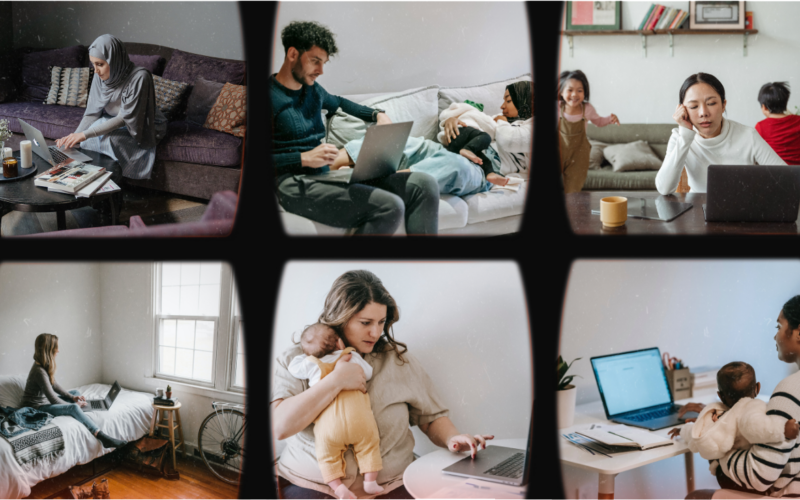
by Catherine McCall
Like many organizations, we at Literacy Volunteers of Charlottesville/Albemarle (LVCA) have grappled with the challenges of supporting adults in our community who are eligible to apply for naturalization. Since the pandemic shut down our in-person classes in 2020, we have been experimenting with a variety of approaches to making citizenship preparation more accessible. While we continuously strive to improve, our efforts thus far have borne fruit—we went from having a 10-year average of 13 citizenship students each year who went on to pass their citizenship interviews to an average of 65 per year over the past two years.
We know that for many of our students, transportation and fitting classes into their schedule are significant barriers. Our students have the option of in-person or Zoom classes, with our Zoom classes being more popular by a ratio of more than 5 to 1. Our Zoom classes are offered both in the morning and the evening using the same Zoom link, so if a student who normally attends the morning class is unable to come on a given day, they can attend the same class that evening.
We also split the curriculum into two distinct citizenship preparation classes which are taught concurrently: Civics for the Citizenship Test and English for the Interview. Students who have limited availability, and those who are strong in one area, have the option to join just one class. While the majority of our students take both, we have had a number of students who have taken advantage of the flexibility that this class division provides.
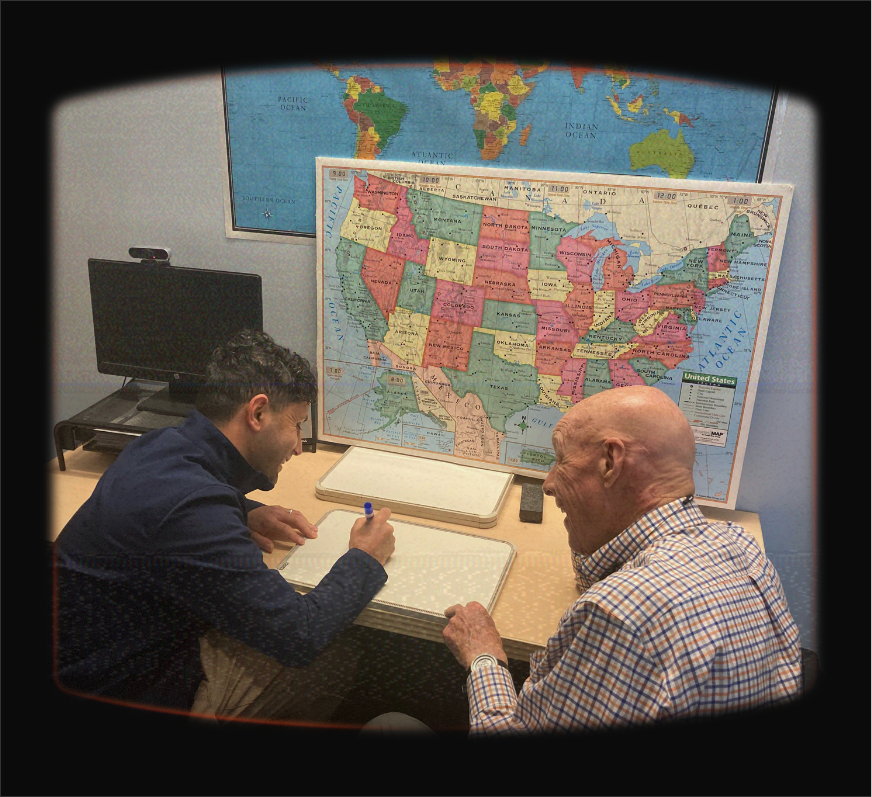
Because many adult education students need to stop out for a variety of reasons, we try to make it easy for students to come back. Our class sessions are nine weeks, allowing us to provide three enrollment windows over the course of a year. The majority of our citizenship students observe Ramadan, and this model lets us take of that month between class sessions. During the gaps between sessions in the summer and late fall, we offer a four-week practice drop-in class, open to any students who have previously taken our group citizenship classes. Offering three shorter sessions, in addition to the practice drop-in mini-sessions, reduces the time commitment for students while also making it easier for those who left to start up again.
To aid students who miss classes, we have created videos that cover the same content as each class meeting, which we send out each week to all students who have enrolled for that session. This allows students who have been absent to feel more comfortable re-joining the course when they are able. Additionally, some of our students listen in during our Zoom classes while they are working, driving, or caring for their families—the follow-up videos allow for easy review.
For students with lower-level English who want to begin learning skills and content that they will need for citizenship, we offer specialized in-person group classes. All of our students (and members of the public) have access to resources on our website, which we have compiled to help them prepare for naturalization—including our video and audio recordings. I’ve had students tell me that while they missed seeing me between class sessions, they didn’t really miss me because they were seeing and/or hearing me every day as they continued to review on their own.
Because we have many volunteer tutors working with students on citizenship, we have made it a priority to provide resources to help our tutors effectively support their students in working toward that goal. The primary mission of our organization is to offer one-on-one tutoring, and we’re proud to have 250 volunteer tutors supporting the literacy goals of our students. Each year, a subset of the students who are paired with tutors work towards naturalization as part of their literacy studies. Additionally, new students sometimes come to us much closer to their naturalization interviews; in these cases, we offer more intensive short-term tutoring to help them prepare. We share all of our class PowerPoint slides and videos with our tutors—some tutors will watch the class videos alongside their students, controlling the playback speed and stopping at intervals to discuss and review. Others take advantage of our reading library and online resources to integrate activities relevant to their studies. Tutors have access to the textbook we use in our civics class, our custom-made English for the Interview handbook, and activities we have created for citizenship practice.
Finally, to help ease anxiety about the naturalization interview, we offer mock naturalization interviews to all of our current and former students. Many of our tutoring pairs will join me for a three-person mock interview—I play the role of the officer while the tutor observes and takes notes to identify strengths and areas for improvement.
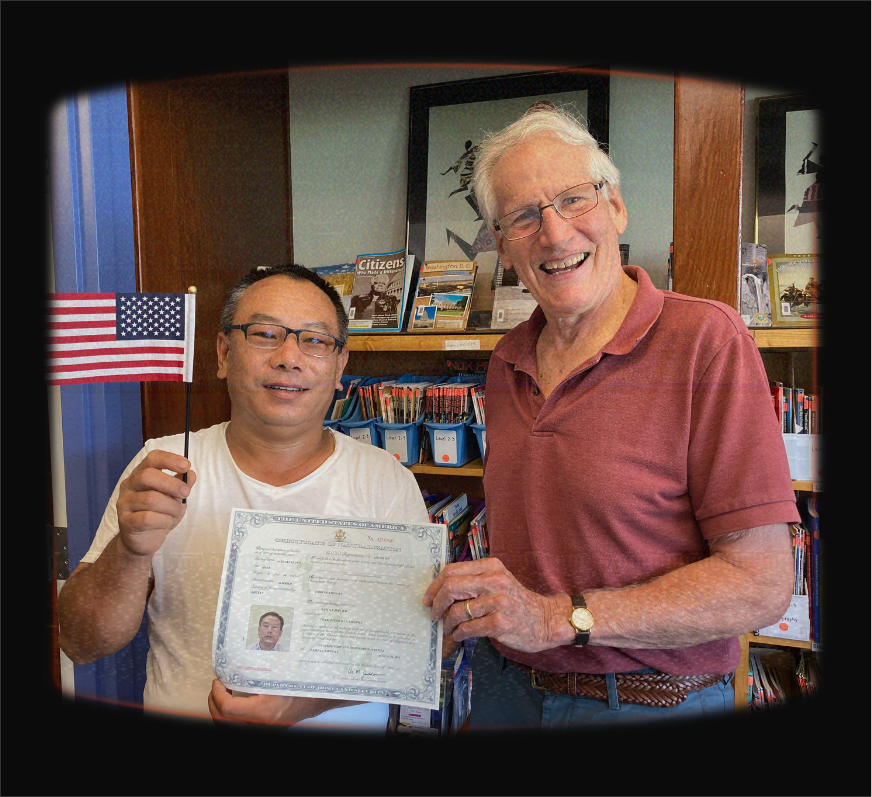
We celebrate as each student passes their interview and as our citizenship program grows. The support we receive from individual donations, private grants, and the Virginia Literacy Foundation allows us to invest in a citizenship preparation program which is meeting the needs of more students than ever before.
Resources
Literacy Volunteers of Charlottesville/ Albemarle citizenship homepage
Literacy Volunteers of Charlottesville/ Albemarle YouTube channel
Literacy Volunteers of Charlottesville/ Albemarle YouTube playlist with citizenship videos
4 parts of the citizenship interview
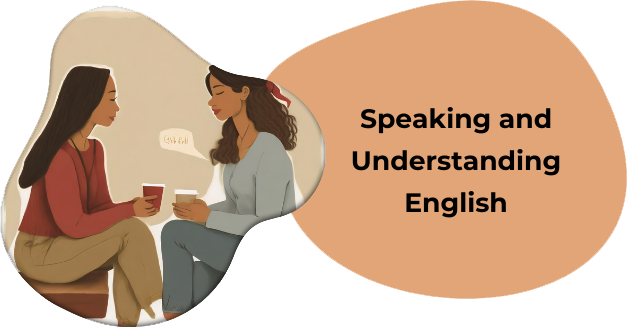 |
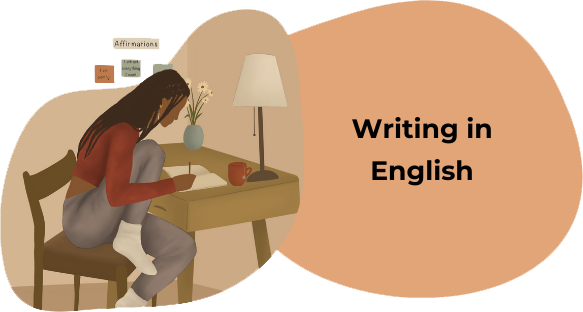 |
|---|---|
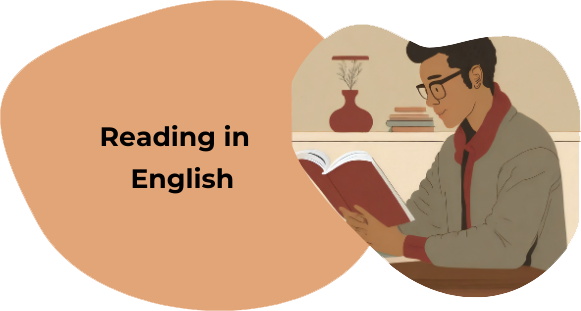 |
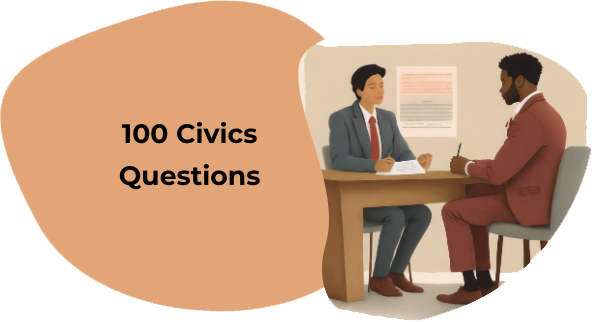 |
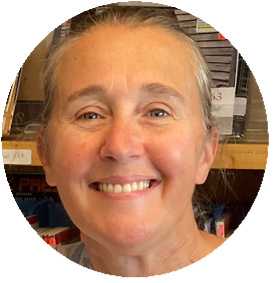 Catherine McCall is the Citizenship Coordinator for Literacy Volunteers of Charlottesville/Albemarle, and has been serving in that role for four years. She has more than 25 years of experience as an educator, including teaching high school social studies, leading curriculum development and training for a civic education nonprofit, and working in teacher education at the University of Maryland College Park. Catherine earned a bachelor’s degree in history from the University of Virginia and a master’s degree in education from the University of Maryland. Her current role allows her to combine her love of civic education with the joy she finds in working with adult English learners and supporting volunteer tutors.
Catherine McCall is the Citizenship Coordinator for Literacy Volunteers of Charlottesville/Albemarle, and has been serving in that role for four years. She has more than 25 years of experience as an educator, including teaching high school social studies, leading curriculum development and training for a civic education nonprofit, and working in teacher education at the University of Maryland College Park. Catherine earned a bachelor’s degree in history from the University of Virginia and a master’s degree in education from the University of Maryland. Her current role allows her to combine her love of civic education with the joy she finds in working with adult English learners and supporting volunteer tutors.